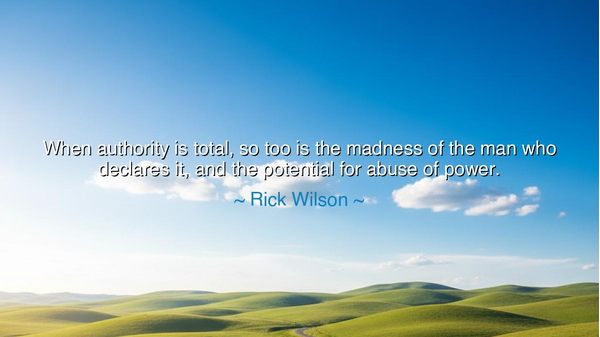
When authority is total, so too is the madness of the man who
When authority is total, so too is the madness of the man who declares it, and the potential for abuse of power.






“When authority is total, so too is the madness of the man who declares it, and the potential for abuse of power.” These words from Rick Wilson call us to reflect on the destructive nature of absolute power and the madness that often accompanies it. The ancient sages, from Socrates to Cicero, warned that when a ruler holds unchallenged authority, it breeds not only corruption but a dangerous form of insanity — a detachment from reason, morality, and the truth. To wield total authority is to put one’s soul at risk, for the corruption of power strips the individual of their humanity and opens the door to the abuse of that power.
The great philosopher Plato explored this very concept in his writings on the nature of tyranny. In his Republic, he describes how a tyrant begins as a seemingly ordinary person, but the unchecked authority they acquire drives them toward madness. The tyrant becomes consumed by their own desires and fears, and their decisions, no longer guided by reason or justice, become a dangerous force that oppresses others. Plato believed that when authority is absolute, the ruler loses sight of the common good and becomes a puppet of their own passions, setting the stage for abuse and suffering.
Consider the reign of Emperor Nero of Rome, a man whose madness was a direct result of his absolute authority. As emperor, Nero had total control over the Roman Empire, yet his reign was marked by excess, cruelty, and brutality. He believed himself to be beyond reproach, and this sense of invulnerability fueled his madness. His decision to persecute Christians, as well as his alleged involvement in the burning of Rome, were not acts of rational governance but signs of a mind corrupted by power. The abuse of power was evident in the suffering he caused to countless people, demonstrating how unchecked authority leads to devastation.
Similarly, Adolf Hitler's rise to power in Nazi Germany is an example of how total authority corrupts the mind of a leader and leads to untold abuses. Hitler, who began as a figure of populist appeal, ultimately became a tyrant who inflicted horrific suffering on millions. His totalitarian regime was founded on the idea of absolute authority, and as that power grew, so did his madness. His belief in his own infallibility led him to commit atrocities that scarred humanity forever, showing the devastating consequences of allowing a leader to hold total, unchecked authority.
Thus, Rick Wilson’s words serve as a powerful warning to all societies: when authority is concentrated in the hands of one person or a single group, the potential for madness and abuse of power grows exponentially. The ancient philosophers understood this well, and history has shown us the disastrous consequences of failing to check power. To prevent such corruption, societies must maintain a balance of power, ensuring that no one individual or group can wield absolute control without accountability.
In the end, Wilson reminds us that true authority is not the product of force or domination, but of wisdom, fairness, and the will of the people. The wise leader, like those the ancients revered, governs with humility, recognizing that the power they hold is a trust, not a right to exploit. It is when authority becomes total and unchecked that madness takes hold, and abuse of power becomes inevitable.






PAPhuong Anhh
I find this quote deeply thought-provoking because it links power with both madness and ethical risk. Could it be that humans are psychologically ill-equipped to handle absolute control? If so, what lessons can we draw for leadership and governance? Should societies inherently limit authority, or is the focus better placed on cultivating virtue and accountability in those who lead? How do we balance effective leadership with safeguards against the potential for abuse?
HTHan Truong
This statement prompts me to question how societies can recognize early signs of dangerous concentration of power. What indicators reveal that an authority figure is on the path to abuse? Can transparency, civic engagement, and institutional oversight realistically counteract these tendencies, or are they insufficient against human ambition and ego? I also wonder whether this risk applies equally in non-political contexts, like corporations or social movements, where influence can also be totalizing.
DTDat Thanh
Reading this, I feel both alarmed and curious about the psychological aspect of total authority. Does absolute power inherently distort perception and judgment, or is madness a consequence of isolation and lack of accountability? I’m interested in exploring whether modern democracies, with checks and balances, have truly mitigated this risk, or if subtle forms of unchecked authority still create dangerous potentials in political and corporate environments.
NANgoc Anh
This quote makes me reflect on historical examples where unchecked authority led to catastrophic outcomes. I wonder, though, whether the potential for abuse is inherent in power itself or in the character of the individual wielding it. Are there structures or systems that can allow authority to exist without tipping into madness or corruption? How much responsibility lies with society to create safeguards, and can those safeguards truly prevent human folly?